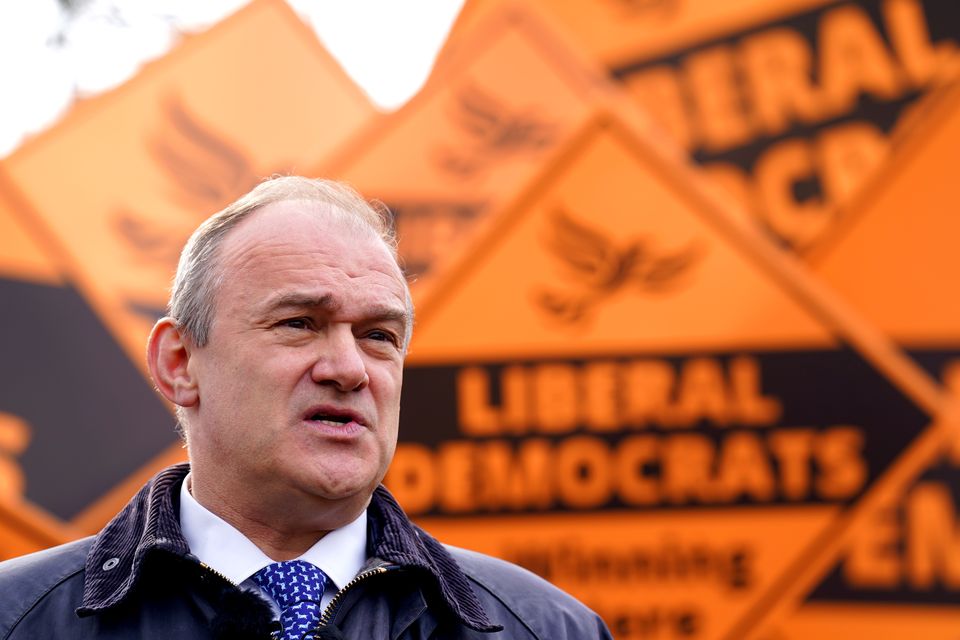
Liberal Democrat leader Sir Ed Davey (Joe Giddens/PA)
By Gavin Cordon, PA
Today
Doggedly determined Liberal Democrat leader Sir Ed Davey has spent much of his life struggling to overcome setbacks and adversity.
Having risen to become a cabinet minister in David Cameron’s Conservative-Lib Dem coalition, he suffered the humiliation of losing his Commons seat when his party suffered a near wipeout in the 2015 general election.
His first attempt at the party leadership ended in defeat when he was well-beaten by Jo Swinson – by a majority of almost two to one – in the 2019 contest to succeed Sir Vince Cable.
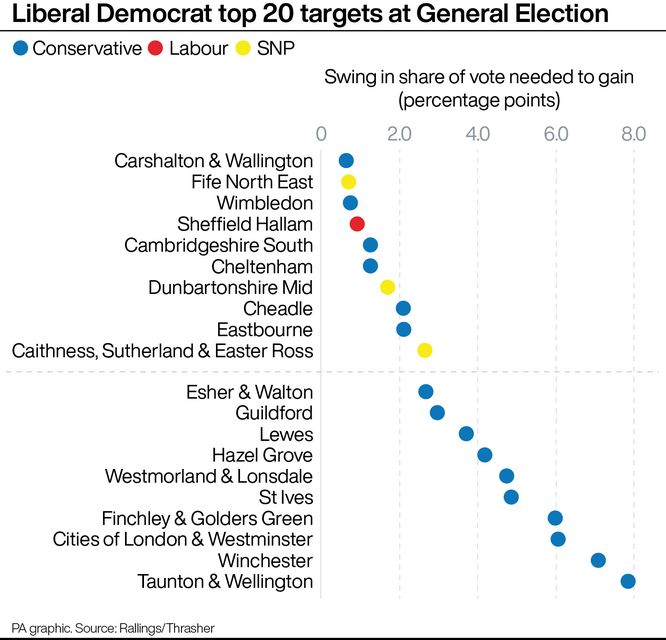
(PA Graphics)
More recently his efforts to lift the Lib Dems out of the political doldrums, where they have languished for most of the last decade, have been hit by disclosures over his role as minister amid the Post Office Horizon IT scandal.
From early childhood Sir Ed became accustomed to adversity, losing his father when he was just four, followed by the death of his mother from cancer when he was 15.
Along with his two brothers, he found himself thrust into the role of unpaid carer during her final illness – a role he was to repeat first for his grandmother and then, years later, with his wife Emily when their first child John was born severely disabled.
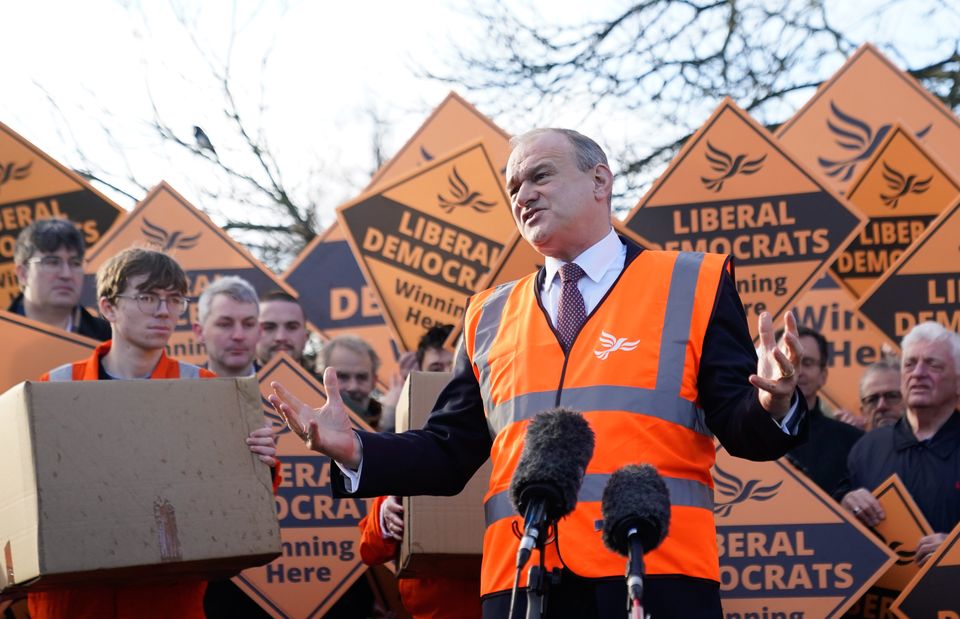
Sir Ed Davey on the campaign trail (Andrew Matthews/PA)
Difficulties at home, however, did not stop him excelling academically, becoming head boy at the fee-paying Nottingham High School and winning a place at Jesus College, Oxford, where he got a first in philosophy, politics and economics.
Having worked for the Lib Dems as an economics researcher, at the age of 31 he entered Parliament at the first attempt, taking the Tory-held seat of Surbiton at the 1997 general election.
He later admitted his victory, by a margin of just 56 votes, had come as something of a shock and that he had been banking on another five years as a management consultant before committing to a full-time career in politics.
At Westminster, he was associated with the “Orange Book” group of Lib Dems – including future leader Sir Nick Clegg – who argued for an economically liberal, free market approach to dealing with social problems, to the consternation of some on the left of the party.

Sir Ed Davey with then-Lib Dem leader Sir Nick Clegg (Steve Parsons/PA)
He was an outspoken critic of what he described as the “nanny state” policies of the Labour government to ban all smoking in pubs and to impose new restrictions on gambling machines.
More widely he made a mark tabling the clause which repealed Section 28 – the Thatcher-era law banning the “promotion” of homosexuality in schools.
Having held a series of frontbench posts under Charles Kennedy and Sir Menzies Campbell, he was given the foreign affairs brief by Sir Nick when he became leader in 2007.
His argumentative streak surfaced when he was suspended from the Commons for a day for contesting a ruling by the Speaker excluding a Lib Dem motion calling for a referendum on the UK staying in the EU (which they supported).
When the Lib Dems joined the Conservatives in forming a coalition following the 2010 general election, he entered government in the relatively lowly position of a junior business minister.
However when fellow Lib Dem Chris Huhne was forced to resign for illegally dodging speeding points, Sir Ed was promoted to the cabinet as energy and climate change secretary.
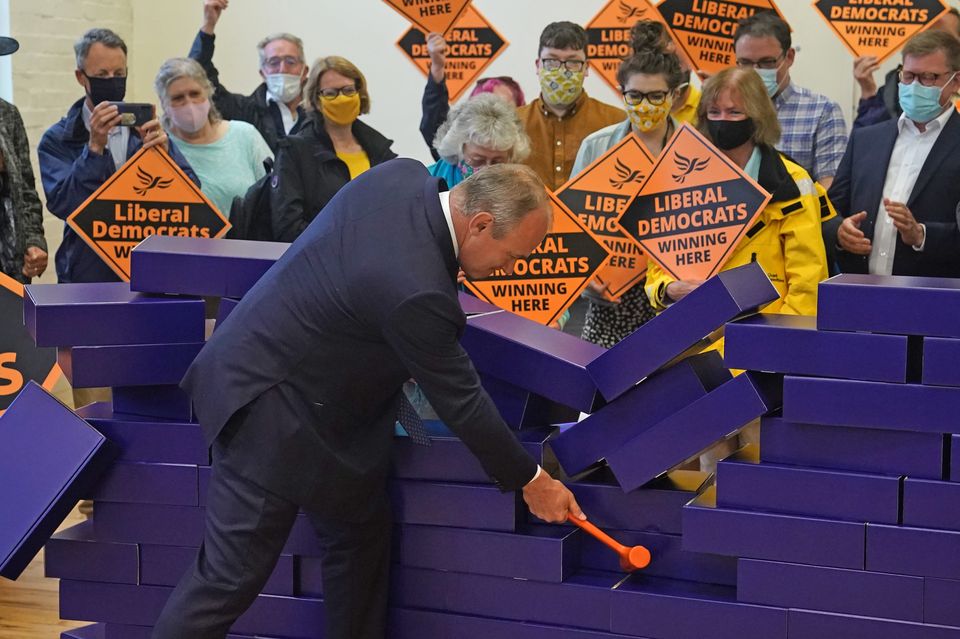
Sir Ed Davey celebrates the Lib Dem by-election victory in the Tory ‘blue wall’ seat of Chesham and Amersham (Steve Parsons/PA)
In that role, he championed the expansion of both renewables and nuclear to reduce carbon emissions as well as foreign investment in the UK energy sector by countries such as China.
He was so vigorous in his support for deregulation and energy market liberalisation that even one Tory minister complained that he was “a bit right wing for me”.
When, in the 2015 general election, the Lib Dems paid the price for their support for the Conservatives – losing all but eight of their seats – Sir Ed was among the high-profile casualties.
As consolation, he accepted a knighthood.
His return, however, was swift, regaining his seat – which had been redrawn as Kingston and Surbiton – in the 2017 election on another otherwise disappointing night for the Lib Dems.
He chose not to run in the ensuing leadership contest, citing family reasons, but following the resignation of Sir Vince two years later he threw his hat in the ring only to lose out to Ms Swinson.
When she too quit following the Lib Dems’ “high-speed car crash” of a campaign in the 2019 general election, Sir Ed was by far the most experienced contender to succeed her, beating Layla Moran by a similar margin to that by which he had been defeated in the previous contest.
He has benefited from the turmoil which has engulfed the Conservative Party, with the Lib Dems notching up an impressive series of by-election victories in hitherto safe Tory “blue wall” constituencies.
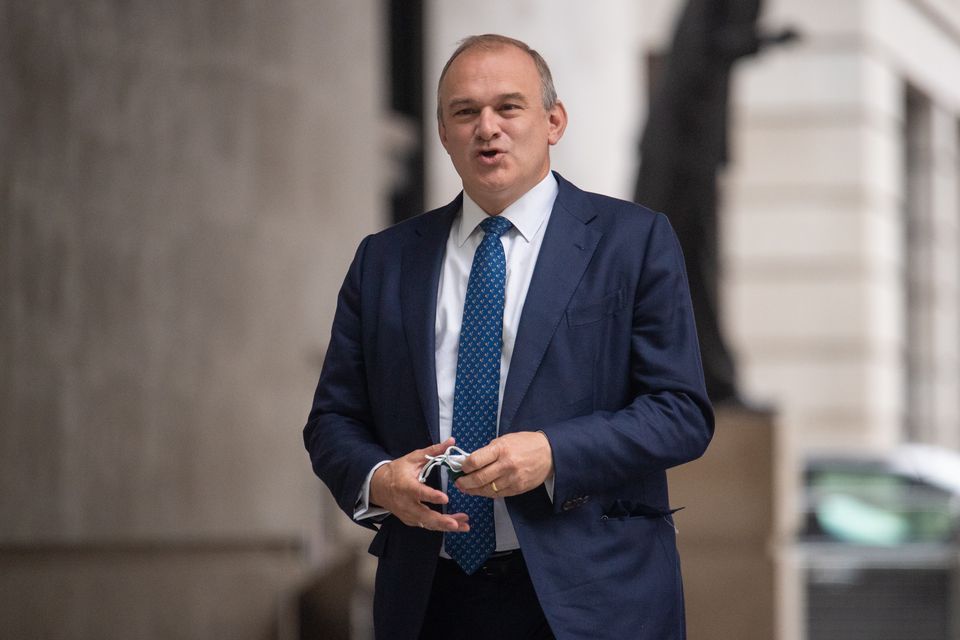
Sir Ed Davey (Dominic Lipinski/PA)
He suffered a knockback however when he was criticised by Alan Bates, who led the campaign for justice for sub-postmasters wrongly convicted in the Horizon scandal, for initially refusing to meet him when he was business minister with responsibility for postal affairs.
The disclosure led to calls from Tory MPs for the Lib Dem leader – who has never been slow in calling for others to quit – to stand down and to hand back his knighthood.
The Lib Dems insist it is unfair for him to be singled out in this way, arguing that he was only one of a series of postal ministers, from all three main parties, to hold office over the course of the scandal.
Sir Ed himself has apologised for failing to see through the Post Office’s “lies” but complained that he, like other ministers, was deceived “on an industrial scale”.
With his eyes set firmly on restoring the Lib Dems as a serious political force at Westminster, he will be hoping such controversies do not dent his chances.
Election means early test for Swinney weeks after becoming First Minister
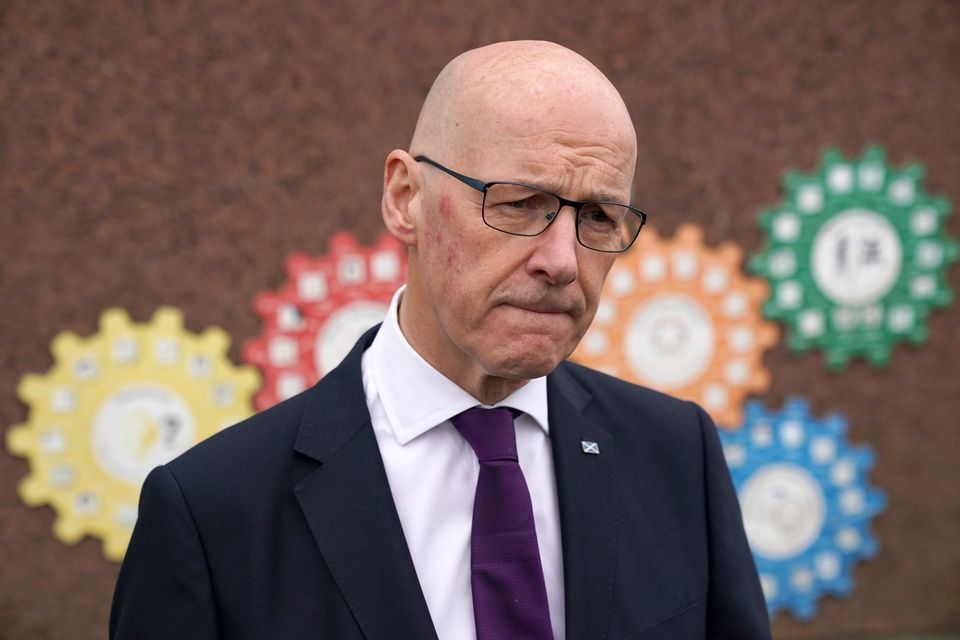
The general election will mark an early electoral test for John Swinney – who only returned as SNP leader earlier in May (Andrew Milligan/PA)
By Katrine Bussey, PA Scotland Political EditorToday at 10:30
Labour seems to be the party best placed to make gains in Scotland in the general election.
New SNP leader and First Minister John Swinney has vowed to work to get his party into a winning position, but pollsters have warned he faces a “major uphill task”.
The Westminster election will therefore mark an early test for Mr Swinney – who only took over as leader of his party earlier this month, returning for a second shot at the job.
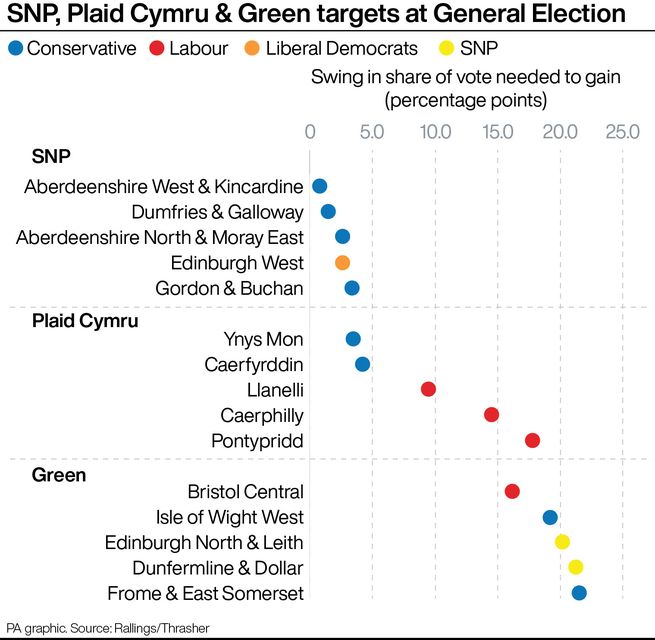
(PA Graphics)
The SNP has for so long been the dominant force in politics north of the border, but a recent YouGov poll put Labour, led in Scotland by Anas Sarwar, 10 points ahead.
In the last general election in December 2019, Scots returned just one Labour MP – down from seven – with Ian Murray holding on to his Edinburgh South seat.
Since then, support for Labour has been on the rise, with the research by YouGov earlier in May putting the party’s share of the vote in Scotland at 39% – up five points from its April poll.
Analysis suggests that could see Labour, which currently has two Scottish MPs, win 35 seats north of the border.
Doggedly determined Liberal Democrat leader Sir Ed Davey has spent much of his life struggling to overcome setbacks and adversity.
Having risen to become a cabinet minister in David Cameron’s Conservative-Lib Dem coalition, he suffered the humiliation of losing his Commons seat when his party suffered a near wipeout in the 2015 general election.
His first attempt at the party leadership ended in defeat when he was well-beaten by Jo Swinson – by a majority of almost two to one – in the 2019 contest to succeed Sir Vince Cable.

(PA Graphics)
More recently his efforts to lift the Lib Dems out of the political doldrums, where they have languished for most of the last decade, have been hit by disclosures over his role as minister amid the Post Office Horizon IT scandal.
From early childhood Sir Ed became accustomed to adversity, losing his father when he was just four, followed by the death of his mother from cancer when he was 15.
Along with his two brothers, he found himself thrust into the role of unpaid carer during her final illness – a role he was to repeat first for his grandmother and then, years later, with his wife Emily when their first child John was born severely disabled.

Sir Ed Davey on the campaign trail (Andrew Matthews/PA)
Difficulties at home, however, did not stop him excelling academically, becoming head boy at the fee-paying Nottingham High School and winning a place at Jesus College, Oxford, where he got a first in philosophy, politics and economics.
Having worked for the Lib Dems as an economics researcher, at the age of 31 he entered Parliament at the first attempt, taking the Tory-held seat of Surbiton at the 1997 general election.
He later admitted his victory, by a margin of just 56 votes, had come as something of a shock and that he had been banking on another five years as a management consultant before committing to a full-time career in politics.
At Westminster, he was associated with the “Orange Book” group of Lib Dems – including future leader Sir Nick Clegg – who argued for an economically liberal, free market approach to dealing with social problems, to the consternation of some on the left of the party.

Sir Ed Davey with then-Lib Dem leader Sir Nick Clegg (Steve Parsons/PA)
He was an outspoken critic of what he described as the “nanny state” policies of the Labour government to ban all smoking in pubs and to impose new restrictions on gambling machines.
More widely he made a mark tabling the clause which repealed Section 28 – the Thatcher-era law banning the “promotion” of homosexuality in schools.
Having held a series of frontbench posts under Charles Kennedy and Sir Menzies Campbell, he was given the foreign affairs brief by Sir Nick when he became leader in 2007.
His argumentative streak surfaced when he was suspended from the Commons for a day for contesting a ruling by the Speaker excluding a Lib Dem motion calling for a referendum on the UK staying in the EU (which they supported).
When the Lib Dems joined the Conservatives in forming a coalition following the 2010 general election, he entered government in the relatively lowly position of a junior business minister.
However when fellow Lib Dem Chris Huhne was forced to resign for illegally dodging speeding points, Sir Ed was promoted to the cabinet as energy and climate change secretary.

Sir Ed Davey celebrates the Lib Dem by-election victory in the Tory ‘blue wall’ seat of Chesham and Amersham (Steve Parsons/PA)
In that role, he championed the expansion of both renewables and nuclear to reduce carbon emissions as well as foreign investment in the UK energy sector by countries such as China.
He was so vigorous in his support for deregulation and energy market liberalisation that even one Tory minister complained that he was “a bit right wing for me”.
When, in the 2015 general election, the Lib Dems paid the price for their support for the Conservatives – losing all but eight of their seats – Sir Ed was among the high-profile casualties.
As consolation, he accepted a knighthood.
His return, however, was swift, regaining his seat – which had been redrawn as Kingston and Surbiton – in the 2017 election on another otherwise disappointing night for the Lib Dems.
He chose not to run in the ensuing leadership contest, citing family reasons, but following the resignation of Sir Vince two years later he threw his hat in the ring only to lose out to Ms Swinson.
When she too quit following the Lib Dems’ “high-speed car crash” of a campaign in the 2019 general election, Sir Ed was by far the most experienced contender to succeed her, beating Layla Moran by a similar margin to that by which he had been defeated in the previous contest.
He has benefited from the turmoil which has engulfed the Conservative Party, with the Lib Dems notching up an impressive series of by-election victories in hitherto safe Tory “blue wall” constituencies.

Sir Ed Davey (Dominic Lipinski/PA)
He suffered a knockback however when he was criticised by Alan Bates, who led the campaign for justice for sub-postmasters wrongly convicted in the Horizon scandal, for initially refusing to meet him when he was business minister with responsibility for postal affairs.
The disclosure led to calls from Tory MPs for the Lib Dem leader – who has never been slow in calling for others to quit – to stand down and to hand back his knighthood.
The Lib Dems insist it is unfair for him to be singled out in this way, arguing that he was only one of a series of postal ministers, from all three main parties, to hold office over the course of the scandal.
Sir Ed himself has apologised for failing to see through the Post Office’s “lies” but complained that he, like other ministers, was deceived “on an industrial scale”.
With his eyes set firmly on restoring the Lib Dems as a serious political force at Westminster, he will be hoping such controversies do not dent his chances.
Election means early test for Swinney weeks after becoming First Minister

The general election will mark an early electoral test for John Swinney – who only returned as SNP leader earlier in May (Andrew Milligan/PA)
By Katrine Bussey, PA Scotland Political EditorToday at 10:30
Labour seems to be the party best placed to make gains in Scotland in the general election.
New SNP leader and First Minister John Swinney has vowed to work to get his party into a winning position, but pollsters have warned he faces a “major uphill task”.
The Westminster election will therefore mark an early test for Mr Swinney – who only took over as leader of his party earlier this month, returning for a second shot at the job.

(PA Graphics)
The SNP has for so long been the dominant force in politics north of the border, but a recent YouGov poll put Labour, led in Scotland by Anas Sarwar, 10 points ahead.
In the last general election in December 2019, Scots returned just one Labour MP – down from seven – with Ian Murray holding on to his Edinburgh South seat.
Since then, support for Labour has been on the rise, with the research by YouGov earlier in May putting the party’s share of the vote in Scotland at 39% – up five points from its April poll.
Analysis suggests that could see Labour, which currently has two Scottish MPs, win 35 seats north of the border.
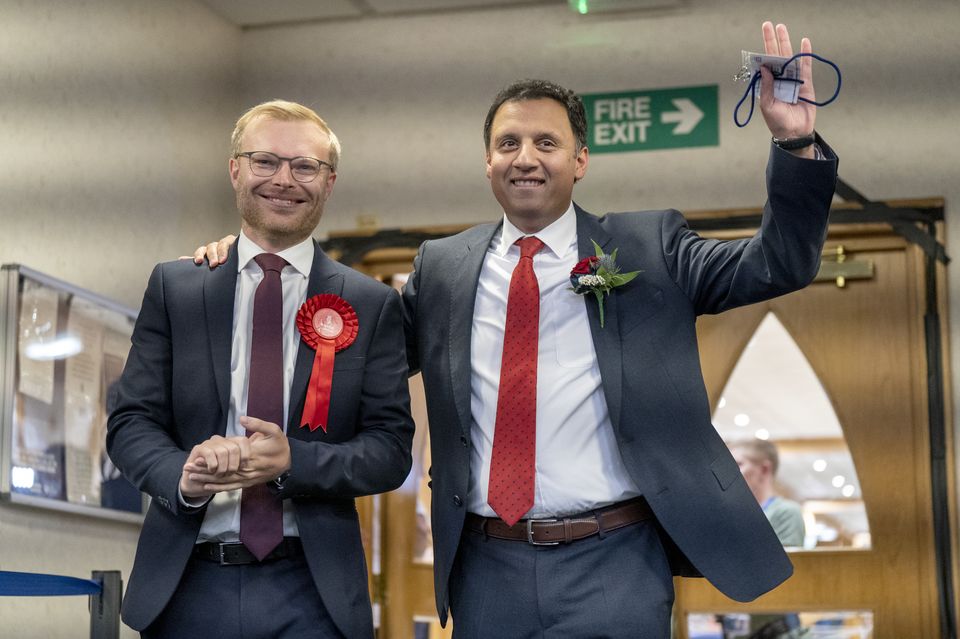
Labour’s hopes of electoral success under Anas Sarwar, right, were boosted when Michael Shanks won the Rutherglen and Hamilton West by-election in October (Jane Barlow/PA)
With support for the SNP said to be down to 29%, its tally of MPs could fall to 11.
That would represent a massive drop in representation at Westminster for the party, which at the peak of its success won all but three of the constituencies north of the border.
That was the result in 2015, when the SNP swept the board in Scotland, winning 56 of the 59 seats up for grabs, leaving Labour, the Liberal Democrats and the Tories with just a single MP each.
Their electoral dominance has continued in Scotland since then – though subsequent election results have seen the party fail to achieve such stratospheric success.

John Swinney, right, only became First Minister earlier this month (PA)
In the December 2019 election, the SNP won 48 of the Scottish 59 seats, however defections and the loss of the Rutherglen and Hamilton West seat in a by-election mean it currently has 43 MPs.
Labour won Rutherglen with a swing of just over 20% from the SNP, boosting the party’s hopes it can once again send a significant number of Scottish MPs to Westminster.
Boundary changes mean that when Scots go to the polls, they will elect 57 MPs, down from 59.
Meanwhile, the Lib Dems also believe they can make gains in Scotland at the SNP’s expense.
In 2019, the Lib Dems won just four seats in Scotland, with then UK leader Jo Swinson losing her Dunbartonshire East constituency to the SNP.
But under the leadership of Sir Ed Davey at UK level and Alex Cole-Hamilton in Scotland, the party is targeting success again, focusing efforts on local councillor Susan Murray’s bid to win the Mid Dunbartonshire seat.
Liberal Democrats also hope they can gain from the SNP in the Highlands, with the party seeking success in the Lochaber, Skye and Wester Ross seat – an area previously represented by former Liberal Democrat leader Charles Kennedy before he lost his seat to Ian Blackford of the SNP in 2015.
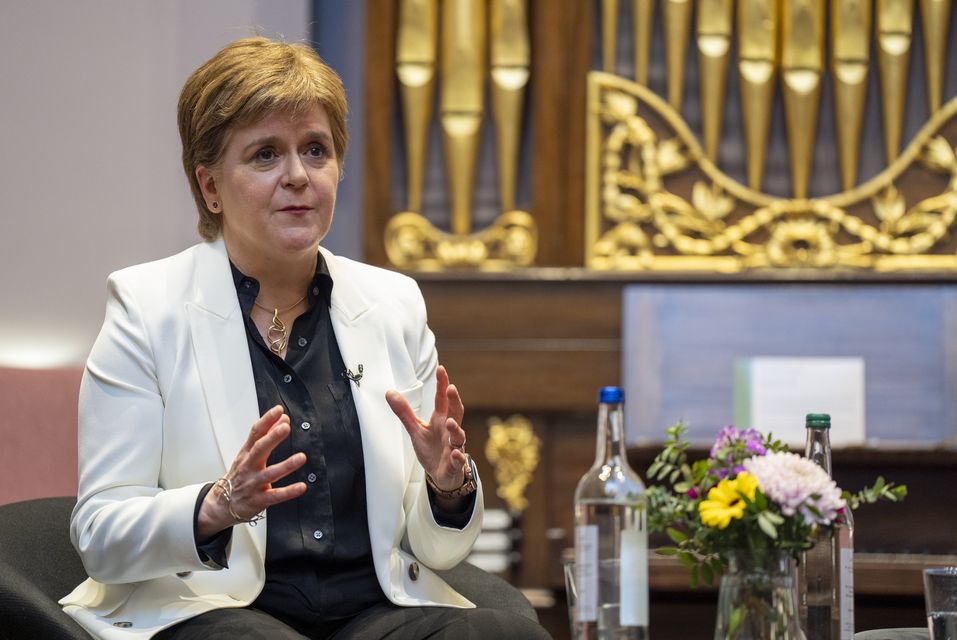
Pollsters have warned Nicola Sturgeon ‘and everything her time in power is now associated with will continue to hang over’ the SNP (PA)
Mr Blackford is one of a number of prominent SNP MPs who are quitting the Commons, with current SNP Westminster deputy leader Mhairi Black stepping down, along with former SNP depute leader Stewart Hosie and Philippa Whitford, who has served as the party’s health spokeswoman.
Earlier this month, Chris Hopkins, political research director at pollsters Savanta, warned of the “major uphill task” Mr Swinney faces going into the election.
Mr Hopkins said: “While our research suggests that the SNP continues to have a solid base, they’re likely to fall quite far from the 43 seats they currently hold at the next general election, as things stand.
“Even if Swinney can begin to turn things around, the spectre of Sturgeon and everything her time in power is now associated with will continue to hang over the party and hamper any recovery.”
Humza Yousaf, who stepped down as first minister and SNP leader earlier in May, had already cited the Police Scotland investigation into the party’s finances as one reason why the SNP lost the Rutherglen by-election in October last year.
Since then Ms Sturgeon’s record as first minister has come under further scrutiny, with confirmation that she deleted WhatsApp messages during the Covid pandemic, sparking criticism.
With the election also taking place during the school holidays – most schools in Scotland finish for the summer at the end of June – parties will also be concerned about the impact this could have on voter turnout.
No comments:
Post a Comment